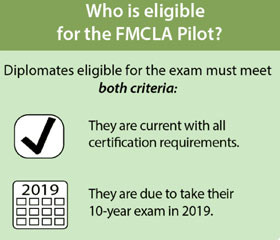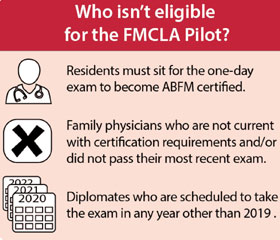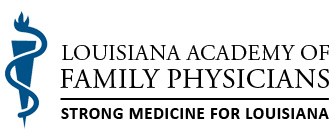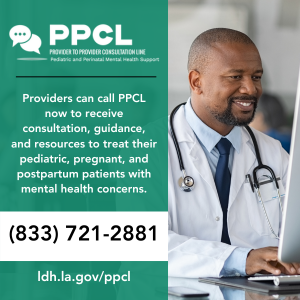ABFM Family Medicine Certification
The Family Medicine Certification process, provided by the American Board of Family Medicine (ABFM), is the means by which the ABFM continually assesses its Diplomates.
- Professionalism
- Self-Assessment and Lifelong Learning
- Cognitive Expertise
- Performance Improvement.
**New** Alternatives for Performance Improvement Activity Credit (formerly Part IV)
Self-Directed Performance Improvement Activity
Continued improvement in clinical practice is a critical hallmark of the commitment family physicians make to ensure they are providing the highest quality care to patients.
- Access to care
- Asthma
- Cancer
- Cardiovascular
- Child and adolescent health
- Communication
- Community health
- Decision support
- Diabetes
- Documentation
- Efficiency
- Emergency medicine
- Geriatric medicine
- Health literacy
- Hypertension
- Immunizations/vaccinations
- Laboratory testing/imaging studies
- Maternity care
- Mental health
- Obesity
- Patient adherence
- Patient education
- Patient engagement
- Patient safety
- Prescriptions
- Preventive care
- Sports medicine
- Satisfaction
- Teamwork
- You may report a project you conducted alone or participated in within a single practice group, an Accountable Care Organization, or other larger group practices.
-
You can use this pathway whether you see patients in a continuity setting, or if you are providing non-continuity episodic care (e.g., hospitalist, telemedicine, locums, urgent care, emergency department, etc.).
-
If you have already done a project, or are currently doing a PI activity in your practice, the process requires simply completing a short, online form available in your ABFM Physician Portfolio describing the activity. Estimated completion time of the form is 15 minutes if you have all the information at hand.
-
If you have not yet started, but are planning, a PI activity, please reference the sample application. This will tell you exactly what steps you will need to take to help ensure your project is eligible for approval by the ABFM before beginning.
-
The individual pathway is for reporting of activities for 1-10 physicians. The ABFM will walk you through the steps to report credit for multiple physicians using a group code. The initial application is estimated to take 15 minutes to complete. Those subsequent physicians claiming credit using the group code should take approximately 5 minutes to complete.
-
Your annual certification fee covers the cost of this activity.
-
ABFM review and approval takes approximately 1 week.
Organizational Performance Improvement Pathway
Similar to the Self-Directed Performance Improvement Activity, the ABFM has also created the Organizational Performance Improvement Pathway to allow groups of more than 10 physicians a way to track, report, and claim credit together for their customized, ongoing QI initiatives, regardless of the scope of care they deliver.
Key things to know about this pathway:
- Organizations, or groups of more than 10 family physicians, may apply for approval for organizational PI activities that will provide certification credit for anyone who is meaningfully participating in the effort.
- These projects may be ongoing, and project teams may participate at different times.
- A designated contact for the organization is responsible for tracking and reporting participation to the ABFM. The person reporting the data can be a non-physician team member or practice designee.
- The organizational pathway only costs $100 per approved PI project, regardless of the number of physicians receiving credit.
- For the self-directed pathway for 1-10 physicians, log in to your ABFM Physician Portfolio, select “Access Performance Improvement Activities” from the main screen, and choose “Self-Directed Performance Improvement Project: Clinical Systems.”
- For the Organizational option, visit the ABFM website for more information on how to submit group projects.
Continuous Knowledge Self-Assessment (CKSA)
ABFM’s continuous Knowledge Self-Assessment (CKSA) can help you continuously identify your personal strengths and weaknesses in medical knowledge and clinical decision-making within the framework of broad-spectrum family medicine. This is accomplished by completing 25 questions per quarter, delivered through your ABFM Physician Portfolio. Completing these can be done throughout the quarter in a manner that best suits your needs and schedule, whenever and wherever it is convenient for you.
Family Medicine Certification Longitudinal Assessment (FMCLA)
Understanding the New ABFM Exam Alternative
(A conversation with ABFM’s Elizabeth Baxley, MD and AAFP’s Clif Knight, MD)

Board Exam Preparation
 The Core Content Review of Family Medicine is a joint production of the Connecticut and Ohio Academies of Family Physicians. The material is authored by a national faculty of physicians and other healthcare professionals. The faculty incorporates a wide spectrum of clinical, research, teaching, and administrative experience into the material. An evidence-based approach to clinical topics is emphasized throughout the writing and editing of The Core Content Review of Family Medicine. All material is peer-reviewed prior to publication.
The Core Content Review of Family Medicine is a joint production of the Connecticut and Ohio Academies of Family Physicians. The material is authored by a national faculty of physicians and other healthcare professionals. The faculty incorporates a wide spectrum of clinical, research, teaching, and administrative experience into the material. An evidence-based approach to clinical topics is emphasized throughout the writing and editing of The Core Content Review of Family Medicine. All material is peer-reviewed prior to publication.

